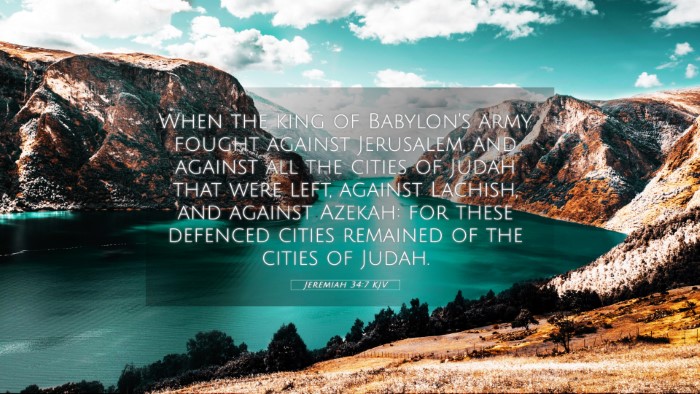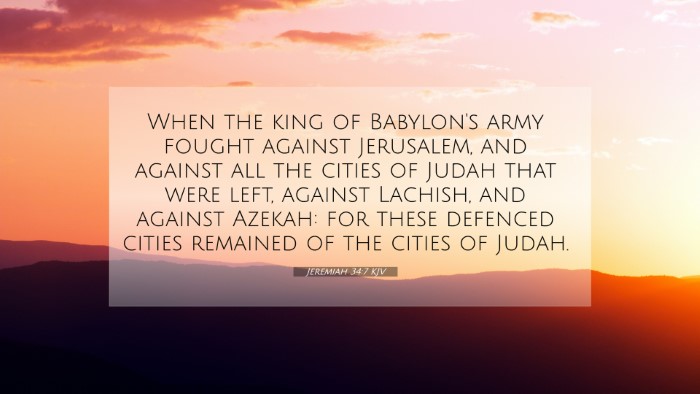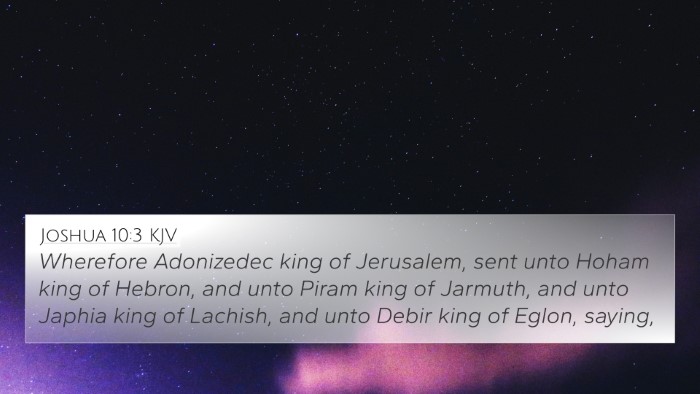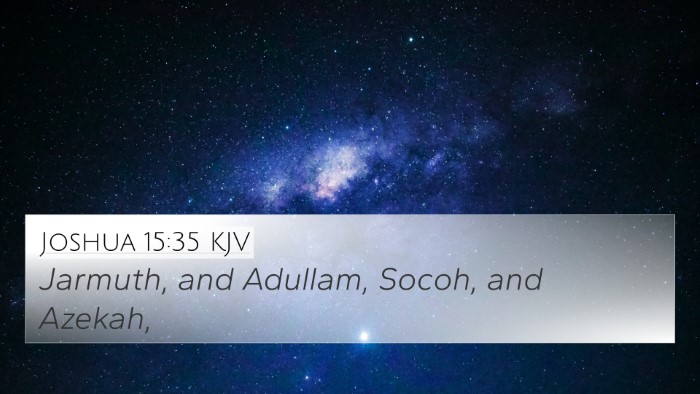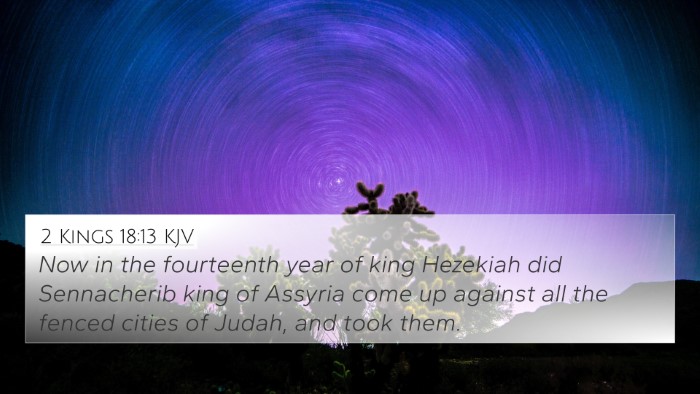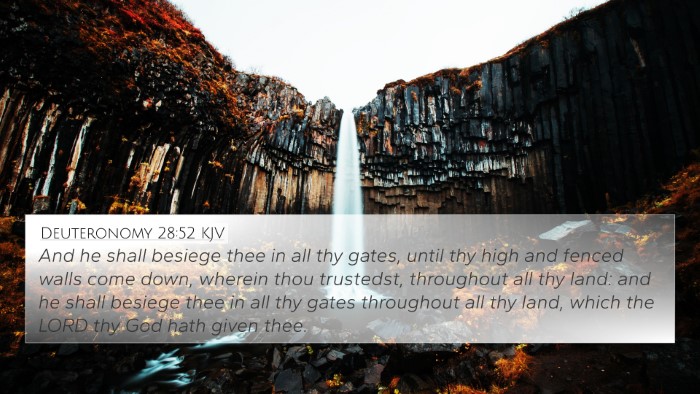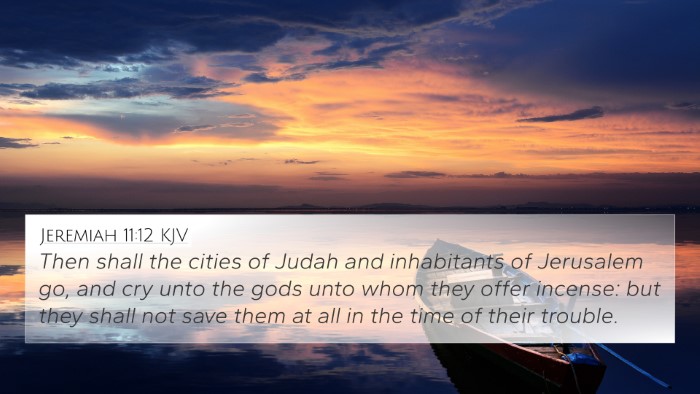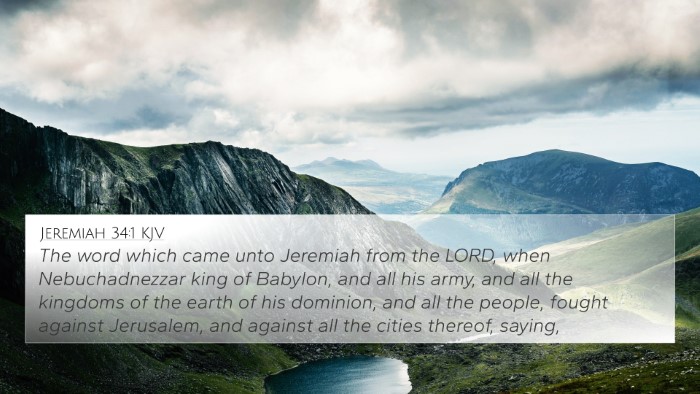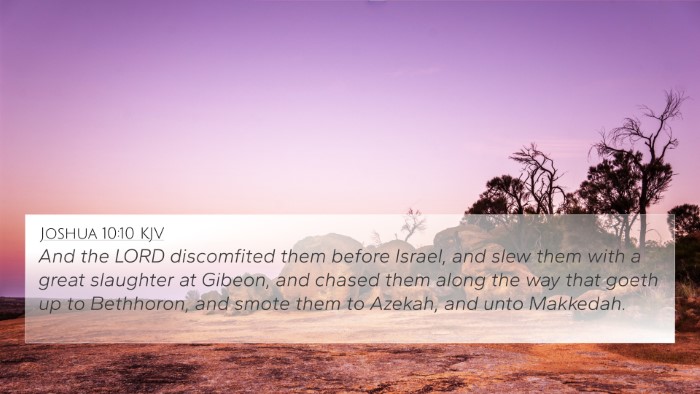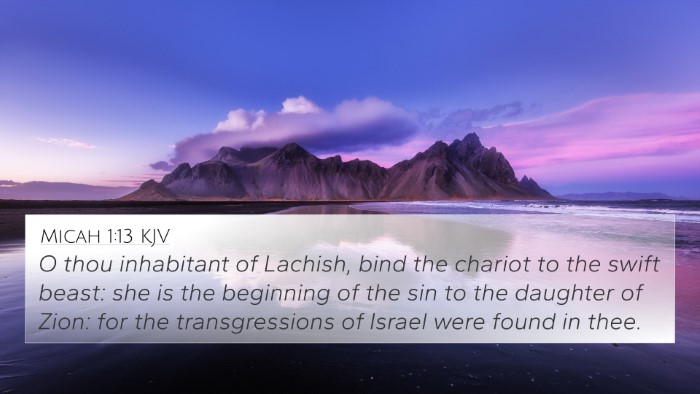Understanding Jeremiah 34:7
Jeremiah 34:7 states: "When the king of Babylon's army fought against Jerusalem, and against all the cities of Judah that were left, against Lachish, and against Azekah: for these defenced cities remained of the cities of Judah." This passage highlights a critical moment during the Babylonian siege and its broader implications for the people of Judah.
Overview of the Verse
The context of this verse is encapsulated within a tumultuous period for Judah. Following the fall of Jerusalem and the surrounding cities, this passage emphasizes the strategic locations of Lachish and Azekah, noted for their fortifications. The verse serves as a historical confirmation of the Babylonian conquests and reflects the ultimate judgment faced by Jerusalem.
Commentary Insights
- Matthew Henry: Henry points out the significance of Lachish and Azekah as emblematic of the strength of Judah. Their resistance to Babylonian forces is indicative of a wider spiritual and social decay within the region, illustrating how the covenant with God was broken, leading to dire consequences.
- Albert Barnes: Barnes emphasizes the role of prophecy in this context. He connects the siege events with prior prophecies, noting how God's message through Jeremiah was not merely predictive but also a warning against idolatry and disobedience, urging the people towards repentance.
- Adam Clarke: Clarke dives into the historical account, detailing that Lachish and Azekah were among the last cities to withstand Babylonian aggression. He draws attention to the relentless military strategy of Nebuchadnezzar and the resultant despair felt by the people of Judah.
Bible Verse Cross-References
Jeremiah 34:7 can be supported and illuminated by several related scriptures that echo similar themes of judgment, prophetic warnings, and the historical backdrop of Israel’s trials. Relevant cross-references include:
- Jeremiah 1:14-15: Discusses God's forewarning of the coming invasions.
- 2 Kings 25:1-3: Chronicles the siege of Jerusalem and the fall of the city.
- Jeremiah 32:1-5: Provides the context of God's prophecy concerning Jerusalem and the subsequent captivity.
- Isaiah 22:1-2: Reflects on the prior warnings about the destruction of cities in Judah.
- Ezekiel 24:2-3: Also discusses the impending doom of Jerusalem as communicated through prophetic visions.
- Lamentations 1:1: Expresses the grief over Jerusalem's downfall, aligning with the emotions present during the time of Jeremiah.
- Zechariah 12:1-6: Speaks about God's eventual restoration even after the devastation, offering hope amidst judgment.
- Matthew 24:2: Jesus references the fate of Jerusalem, indicating its prophetic significance in the New Testament.
Thematic Connections and Inter-Biblical Dialogue
The themes of judgment, hope, and restoration recur throughout Scripture, creating links between various texts that can better inform our understanding of Jeremiah 34:7. Notably, cross-referencing this verse with scriptures from both the Old and New Testaments highlights the ongoing dialogue regarding God's righteousness and mercy.
- The Book of Lamentations: Continues to echo the distress and calamity depicted in Jeremiah's warnings.
- Hebrews 12:6: This incorporates the idea of chastening in God’s love for His people, drawing parallels to the judgment imposed on Judah.
- Romans 11:26: Gives a broader theological perspective on Israel's ultimate restoration, mirroring the hope articulated by Zechariah.
Conclusion
The examination of Jeremiah 34:7 through the lens of public domain commentaries uncovers rich layers of meaning, connecting historical accounts to God’s overarching narrative of justice and mercy. Understanding these dynamics encourages believers to engage more deeply with Scripture, drawing from various biblical references to construct a holistic view of the scriptures.
Tools for Bible Cross-Referencing
For those interested in deepening their scriptural studies and cross-referencing biblical texts, several tools can enhance understanding:
- Bible concordance
- Bible cross-reference guide
- Cross-reference Bible study techniques
- Comprehensive Bible cross-reference materials
Final Thoughts
Through diligent study, one can uncover the intricate tapestry of biblical themes and truths that resonate across various texts. Jeremiah 34:7, in its historical context, not only serves as a poignant reminder of the consequences of disobedience but also invites reflection on God's mercy and the hope of future restoration.

